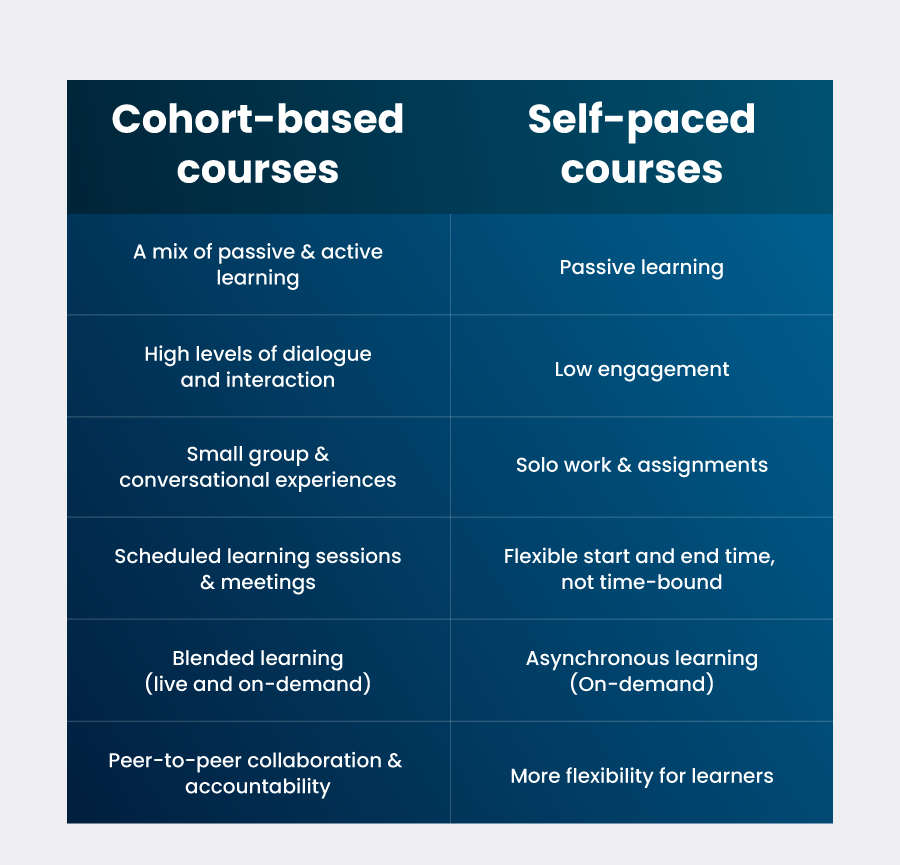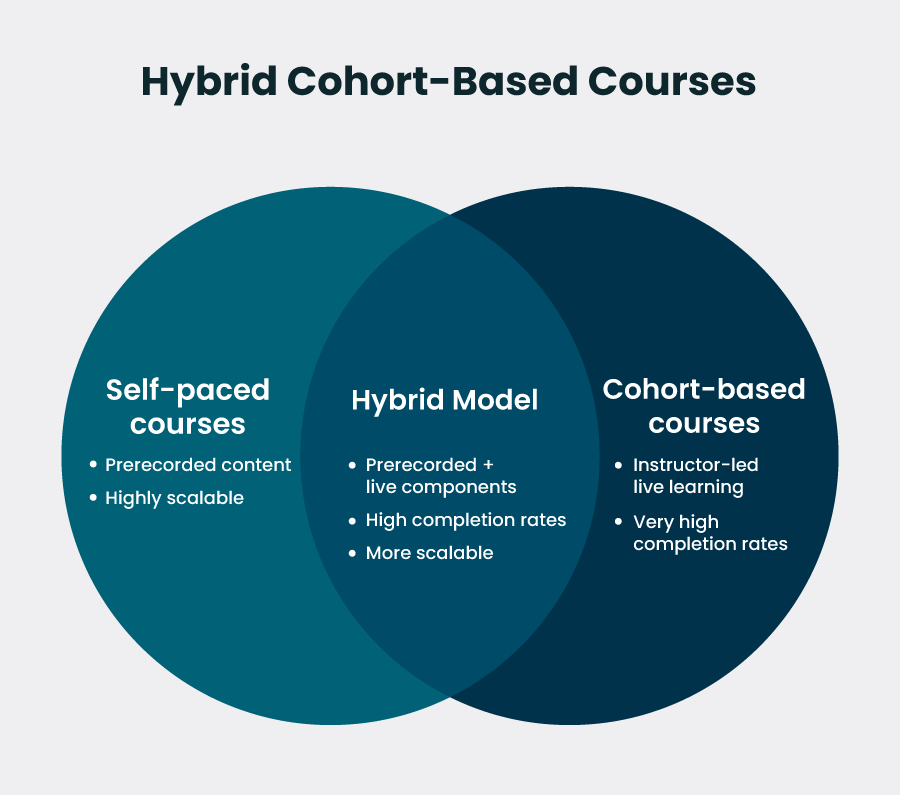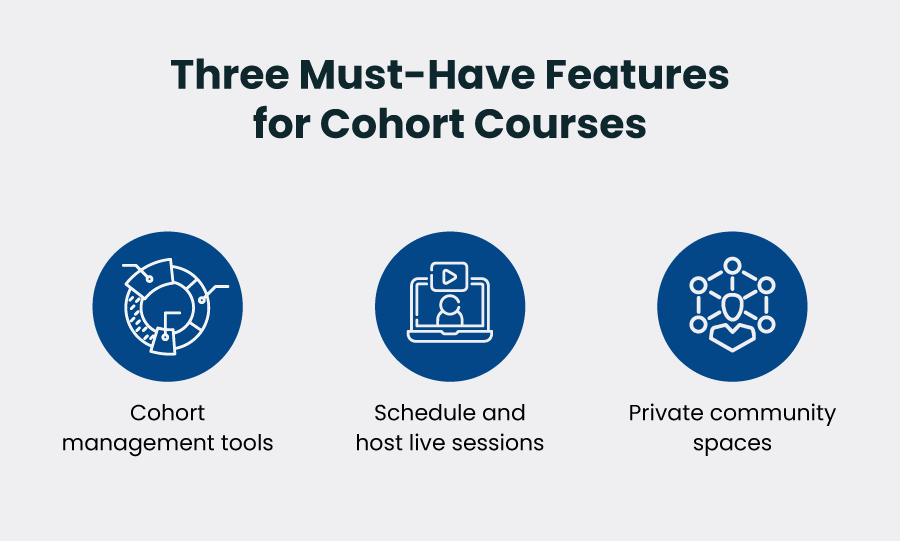We earn a commission from partner links on this site. This doesn’t affect our opinions or evaluations.
Were you aware that certain eLearning data points indicate that the typical completion percentage for online courses can dip to a mere 15%?
Indeed, that figure isn’t particularly encouraging.
If you operate as a course developer and have observed diminishing participation in your courses, it might be beneficial to scrutinize your digital product lineup more meticulously.
A specific online educational product concept gaining traction is the cohort-based course model. These courses are guided by instructors, heavily emphasize collaborative learning approaches, and demonstrate encouraging indicators of student involvement.
Are you prepared to delve deeper into the process of developing cohort-based courses? Let’s begin this exploration.
A cohort-oriented course represents an educational program delivered within an online group or cooperative environment—frequently utilizing video conferencing platforms such as Zoom.
These instructional meetings occur in a live, real-time setting and might be complemented by additional asynchronous educational materials, which could encompass pre-recorded lessons, session recordings, or assignments designed for completion outside scheduled class times.
Timing serves as a fundamental element in the administration of cohort programs. They feature distinct beginning and conclusion dates; they are not self-directed or perpetually open, and the learning journey is organized around guiding students through the content collectively and maintaining a uniform pace.
The foremost objective of a cohort course is cultivating an online educational community swiftly and fostering interaction among peers.
You will discover that cohort initiatives possess noticeable distinctions when contrasted with self-paced online courses, necessitating clarity regarding your objectives before attempting to introduce one.
The following comparison illustrates some key variations between cohort-style and self-directed online course formats.

There is a multitude of positive outcomes connected to well-executed cohort courses, information that all course developers should be aware of.
Let’s detail some of these key benefits below.
It becomes simpler to delay learning when operating independently or when deadlines aren’t clearly defined. Cohort-based courses are structured specifically to mitigate these potential issues. How is this achieved?
Both aspects contribute to boosting participation levels and completion statistics by holding students more responsible.
Engaging with online learning can present challenges for students accustomed primarily to self-directed course formats.
At times, discussing the subject matter covered within a course alongside others proves quite beneficial.
Cohort-based courses inherently function as social gatherings. They are designed for groups of individuals to convene and gain knowledge collectively.
Following a period marked by a global pandemic, numerous learners might actively desire this form of engagement and look for opportunities to forge connections within a fresh learning environment.
From a professional standpoint, they can also serve as valuable networking platforms. The relationships formed within a cohort-based course setting could pave the way for new opportunities for students, both during the course and beyond.
Cohort-based courses represent premium educational experiences and consequently should warrant a more substantial selling price.
Intimate group sizes, direct live interaction with the course instructor, and avenues for specific, personalized feedback all constitute premium characteristics.
Ensure that your course’s established price accurately reflects the significant value invested in creating this enhanced experience for your students.
Organizing a cohort-based course might appear intimidating initially, but it doesn’t need to feel overwhelming.
We have compiled several concise tips and approaches to assist you in getting started, enabling you to circumvent some of the more frequent obstacles and difficulties.
Cohort-based courses are predominantly synchronous in nature. If delivered solely through live sessions, scaling them effectively can prove exceptionally challenging.
This is the primary reason we advocate for implementing a hybrid model that integrates supplementary on-demand activities into your course structure.
Our suggestion is to provide the bulk of your core course content via pre-recorded materials, complementing this with live instructional sessions, group coaching discussions, virtual collaboration spaces, and dedicated ask-me-anything (AMA) forums.

This approach ensures the course remains more easily administrated by you while providing a superior learning pathway for your participants.
When developing cohort-based courses, consistently remain mindful of the specific experience you are cultivating for your learners.
Because cohort courses differ fundamentally from large-scale massive open online courses (MOOCs), careful consideration must be given to the quantity of students admitted.
For courses delivered entirely live, the optimal cohort size typically ranges between 50 and 100 individuals—perhaps fewer if it represents your initial offering or if you aim to foster a more intimate atmosphere.
Conversely, for hybrid course structures, you can accommodate larger cohorts, potentially encompassing hundreds or even thousands of learners.
Exercise caution, however. Should you opt for managing such a substantial cohort, it becomes necessary to segment it into smaller accountability units, assign ample coaches and mentors, and actively encourage their sustained engagement.
If participants feel the cohort is excessively large or perceive limited opportunities for personal contribution, it is likely wiser to commence with a more modest group size and gradually scale upwards.
A significant element of your lessons, associated activities, and overall course materials should actively promote peer-to-peer collaboration.
So, what specific forms might this take?
As an illustration, you could establish a dedicated community zone designed to facilitate and oversee student interactions and discussions.
Alternatively, your cohort course might incorporate smaller sub-groups tasked with maintaining mutual student accountability. These smaller units could operate within a distinct area, perhaps on Facebook or via community-oriented platforms like Mighty Networks.
Furthermore, you will want to integrate collaborative active learning exercises. Examples include assignments for small groups, peer assessment activities, whole-class discussions, and interactive role-playing scenarios.
Cohort-based courses are intentionally structured to be guided by the instructor, yet this can present difficulties if the cohort’s scale or the administrative responsibilities associated with its operation become too demanding.
To guarantee the positive outcome of your cohort initiative, we strongly suggest constructing it with a robust community support structure in place.
For example, you might enlist mentors to offer guidance and motivation to participants at all stages within your cohort program. A frequent tactic involves inviting former students to serve as mentors, leveraging their established familiarity and passion for the objectives your cohort seeks to achieve.
Community managers could also prove essential for supervising and moderating the various discussion forums.
A dedicated student support manager can effectively respond to student inquiries and manage any customer service matters that may emerge.
Alongside a dependable support team, the selection of tools and technology you employ will significantly influence the overall success of your cohort program.
The chosen course creation software will fundamentally shape your approach and inform numerous decisions that steer the design and implementation of your cohort.
While many online course platforms exist, Thinkific stands out as the platform we particularly endorse for facilitating cohort courses.
It furnishes all the crucial tools one would anticipate in a platform designed for cohort courses, while also offering seamless integration with Zoom for conducting live sessions. Additionally, it empowers you to establish and oversee student groups and includes an integrated community feature, enabling the creation of distinct spaces tailored to different cohorts.

<p”>Illustrative Examples of Cohort Based Courses
Each cohort-based course presents a distinct learning environment, making the examination of established programs incredibly beneficial for prospective creators.
Let’s delve into five specific instances of thriving cohort-based courses that encompass a wide array of academic areas and subject matters.

Conceptualized and brought to life by David Perell, Write of Passage presents a rigorous, five-week cohort learning journey focused on writing. It functions as a “social experience,” meticulously crafted to equip participants with the skills for effective online writing and leveraging those abilities for meaningful connections.
This program features interactive live sessions, provides platforms for composing and sharing original content, and incorporates constructive input offered by cohort peers.

Digital Course Academy represents a nine-week hybrid implementation program spearheaded by renowned online course expert, Amy Porterfield.
Within this cohort-structured course, participants receive a detailed, step-by-step blueprint distributed across six distinct learning segments. The training encompasses both real-time (synchronous) sessions and accessible, on-demand (asynchronous) instruction covering the essentials of creating, launching, and effectively marketing a digital course.

The Blockchain Developer Bootcamp presents an eleven-week cohort learning experience meticulously structured to instruct participants in the creation of applications specifically for the Ethereum blockchain.
While expertly guided by an instructor, this intensive program also thoughtfully integrates a collaborative, mutual-learning community designed to support aspiring developers.

Presented via Maven, a platform dedicated to cohort-based course offerings, the Personal Branding Masterclass functions as a real-time, synchronous educational program guided by the experienced instructor Mark Schaefer.
His instructional materials and sessions assist learners in articulating and building their unique personal brands. The entire course extends over a three-week period and carries a premium enrollment fee of $1,500.

The platform Do Yoga With Me provides Online Yoga Teacher Certification programs delivered through a cohort-based course structure.
Advantages for participants in this cohort encompass regular monthly Zoom discussions with peers and instructors, bi-monthly live video streams, established weekly learning objectives, a dedicated study community fostering support and feedback exchange, facilitated group conversations, assigned study partners, and additional collaborative features.
Throughout this guide, we have explored the definition of cohort-based courses and elaborated on the potential advantages they offer to your learners.
We also presented several crucial pointers for your consideration should you decide to develop your own cohort-based educational programs.
Although they might demand significant effort in terms of planning and execution, cohort learning environments possess the potential to substantially elevate student participation and interest.
Simply ensure you begin methodically, operate with a clearly articulated plan, and establish a robust support system to maintain student involvement from the course’s inception to its conclusion.
Do you currently facilitate a cohort-based course? What aspect do you consider the most significant advantage of this learning model? What is the typical size of your course offering? Share your insights with us in the comment area below. We appreciate you reading!

Harding Jerold serves as a marketing writer at sellingonlinecoursesguide.com, where he combines his marketing expertise with compelling copywriting to help course creators effectively promote their educational offerings. His work focuses on developing strategic content that drives engagement, builds audience trust, and helps course creators understand and implement effective marketing strategies in the online education space.


We respect your privacy and will never spam you.